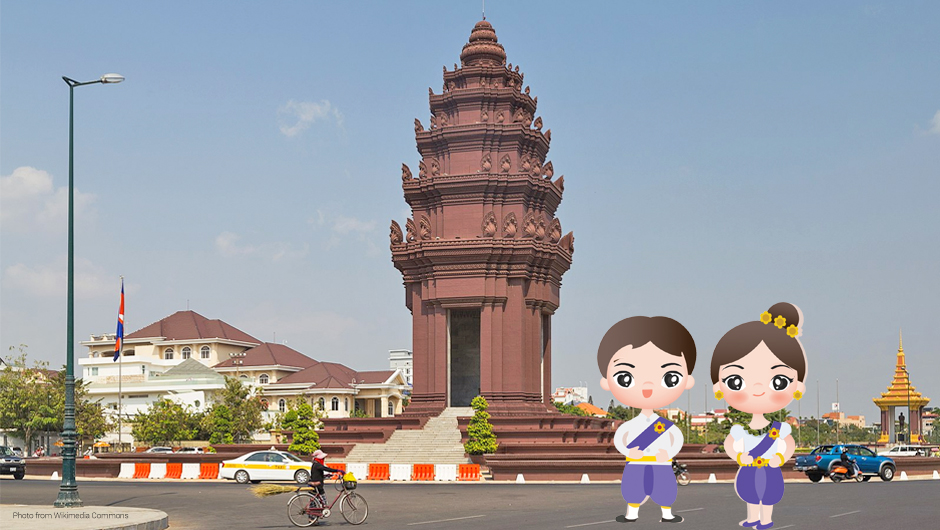Cambodia’s Freedom Journey

The stories about Cambodia today paint a bleak picture of democracy that’s dead. After the forced closure of media outlets, the dissolution of the main opposition party by the Supreme Court, and the increasing shrinking space for civil society, what could be left but desolation?
Yet it is especially at this time when we recognize hope. When there are individuals who don’t surrender their dreams, and instead continue their ‘freedom journey’ in spite the costs.
Stirring the independence narrative
Cambodia’s journey to independence and democracy has been disrupted by various socio-political conflicts.
In 1953, Cambodia gained its independence after 90 years of being under the protectorate of France. The Kingdom of Cambodia was established.
It was also the period of the Cold War. While Cambodia initially pursued a policy of neutrality, it decided to break off diplomatic relations with the United States in 1965, and allowed Vietnamese communists to set up bases in Cambodia.
This led to economic woes in the country that triggered civil unrest. In 1970, a coup deposed Sihanouk who was then the head of state, and the Khmer Republic was inaugurated.
Five years later, the Khmer Republic collapsed. Khmer Rouge forces, which was allied with the communists, occupied the capital city, Phnom Penh. The dark era of Cambodian history took its course.
Year Zero
The world is familiar and aghast with the brutal regime that took the life of 1.5 – 2 million people, or 25% of the Cambodian population.
The reign of the Khmer Rouge, led by Pol Pot (Saloth Sar) began in 1975. The country was again renamed, and called itself Democratic Kampuchea.
Under the Khmer Rouge, Cambodia was transformed into a rural, classless society People were moved to labor camps in the countryside. Intellectuals, professionals, and anybody who were deemed opposition were murdered.
The savagery was ended by another spitefulness, nonetheless less vicious but equally repressive. Vietnamese troops invaded Cambodia in 1979 and only withdrew 10 years later.
Continuing past
Hun Sen became prime minister in 1985. The country changed its name to the State of Cambodia, and Buddhism was reestablished as state religion in 1989.
The 90s was a period of uneasy peace. Sharing of power was made possible by a 1991 peace agreement signed in Paris, and later through the general elections in 1993. A three-party coalition was formed with the royalist Funcinpec party, Hun Sen’s Cambodian People’s Party (CPP), and the Buddhist Liberal Democratic Party (BLDP). Hun Sen became second (deputy) prime minister, while Prince Ranariddh was First Prime Minister. The monarchy was restored, and Sihanouk became king again. The country adopted its old name Kingdom of Cambodia.
The decade was further characterized by power grab and anomalies. After mounting a coup in 1997, Hun Sen became prime minister. The elections in 1998 spelled out the future of Cambodia, and the consequences critically manifest today.
False democracy is more difficult to deal with that outright dictatorship.

Hope as lifeline
The political situation in Cambodia is dire. It is marked by suppression of freedoms – the media crackdown has silenced independent voices, and the irregularity in elections has deprived people of representation. Members of the main opposition party, Cambodia National Rescue Party (CNRP), experience persecution, and crushing CNRP in November 2017 meant exhaling democracy’s last breath.
Yet there remain individuals who try to resuscitate democracy in Cambodia, and revive its natural yearning for freedom and justice. People wanted independence from French rule, and they attained a peaceful end to it in 1953. They demanded justice for the death and torture of hundreds of thousands of people, and they made sure that those responsible for the Cambodian genocide got arrested and charged with crimes against humanity.
All is not lost. Cambodian women leader Mu Sochua writes that “Democracy will not die in the hearts of the Cambodian people. It cannot abolish the hopes and expectations of Cambodia’s 10 million young people, who dream of a promising future, free from corruption and oppression.”
Hope is the lifeline of every freedom journey.